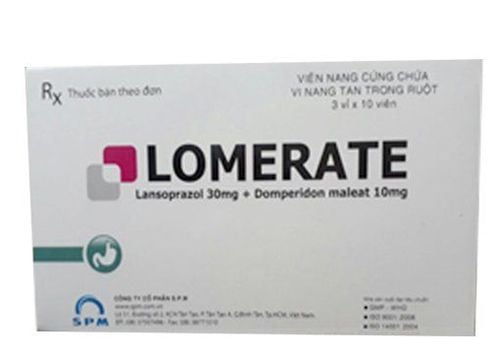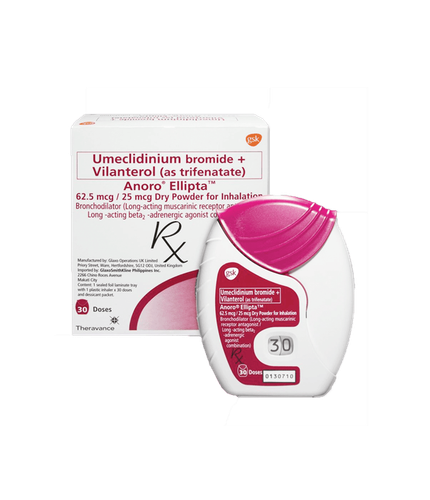This is an automatically translated article.
Bronchodilators are used in cases of bronchospasm. There are many classes of bronchodilators and different mechanisms of action. Because of the different mechanisms, these drugs are sometimes used in combination to increase the effectiveness of treatment.
1. What is a bronchodilator?
Bronchodilator drugs have the effect of relaxing the smooth muscles of the bronchi, bronchial dilation, increasing the diameter of the airways, so that air moves through the airways to reach the alveoli more easily, avoiding the situation. lack of oxygen to tissues.
Bronchodilators can be prepared in many different forms such as oral, injection, spray, aerosol. Oral bronchodilators are usually available in the form of capsules, tablets and solutions.
2. Groups of bronchodilators
Currently, there are 3 groups of bronchodilators used in treatment. These drugs work to widen the airways, but they act on different receptors when taken into the body.
The classes of bronchodilators include:
Sympathomimetic beta-2 agonists (short-acting and long-acting); Anticholinergic drugs (short-acting); The most commonly used Xanthine derivative is theophylline.
2.1. Beta-2 . agonist bronchodilator
Beta 2 agonists stimulate beta adrenergic receptors in the airways. This medication dilates the bronchi, which in turn helps the smooth muscles around the airways relax, improving the flow of air in and out of the lungs to improve shortness of breath.
Beta-2 agonists are divided into 2 groups that are short-acting drugs and long-acting drugs:
Short-acting beta-2 agonists: Some drugs such as Fenoterol, Salbutamol, Terbutaline, can relieve symptoms quickly, but only for a short time. The drug usually takes effect about 20 minutes after taking it, lasting for about 4 to 6 hours. In addition to oral, this type can be used as a highly effective inhaler for cases where symptoms come on quickly and are severe. Long-acting beta-2 agonist group: Includes Salmeterol, Bambuterol, Formoterol. After taking it, it usually takes more than 1 hour to take effect, but the effect of the drug lasts up to more than 12 hours. Therefore, this medication can be used daily for the purpose of stopping bronchospasms and it is not recommended for emergency use. Some cases when using drugs belonging to the beta-2 agonist group in diseases can make the disease worse, so it should be indicated and carefully considered. Some cases of disease need to be cautious including:
People with hyperthyroidism, overactive thyroid; Having cardiovascular problems such as high blood pressure, arrhythmia, heart and blood vessel diseases; Diabetes.
2.2. Anticholinergic drug class
Anticholinergic drugs also known as Antimuscarinics are often used in the treatment of bronchiectasis, chronic obstructive pulmonary disease (COPD), and in some cases can also be used in the treatment of asthma (bronchial asthma). ). The mechanism of action of the drug is to help dilate the bronchi, releasing the accumulated substances that cause the bronchi to constrict.
Anticholinergic drugs have the ability to block the action of acetylcholine. Acetylcholine is a neurotransmitter in the central nervous system and the peripheral nervous system. This substance causes the bronchi to constrict, so the use of anticholinergic drugs will inhibit the activity of the neurotransmitter acetylcholine, thereby causing the patient's airways to dilate.
Use of anticholinergic drugs is recommended with caution in the following subjects:
Enlargement of the prostate gland, benign prostatic hyperplasia; Obstruction of bladder outflow such as bladder stones, prostate cancer. 2.3. Xanthine derivatives Researchers do not know exactly how Xanthine derivatives work when they are taken into the body. But when used, it also has the ability to clear the airways of sufferers. The most commonly used Xanthine derivative is Theophylline. Theophylline is a long-acting bronchodilator, used orally in the form of tablets, capsules or intravenously for severe symptoms.
However, now doctors rarely prescribe Theophylline to patients because many people experience noticeable side effects when using it.
Because it can cause many side effects, it should be used with caution in the following cases:
Thyroid hyperactivity; Cardiovascular diseases and blood pressure; Epilepsy ; Elderly people need to be carefully monitored when taking theophylline.
3. Notes when using bronchodilators
Bronchodilators are indicated in cases of patients suffering from diseases that cause bronchospasm such as bronchial asthma, acute bronchiectasis, chronic obstructive pulmonary disease... Oral medications are commonly used. to prevent recurrence of bronchospasm.
Depending on the condition and severity of the disease, the patient is prescribed the most appropriate medication to treat the disease. When using the drug, you should note the following:
When taking bronchodilators or any medicine there is a risk of causing side effects. Some possible side effects such as trembling hands and feet; headache; arrhythmia , palpitations in the chest; nausea, vomiting; cramp; diarrhea...; When using it, it is necessary to use it exactly as prescribed by the doctor: Patients need to strictly adhere to the drug regimen prescribed by the doctor. Use the right course, dose and duration of use. Monitor the body after each drug use to be able to detect early signs of abnormalities for timely treatment; Use the drug according to the manufacturer's recommendations: To do that, you should carefully read the instructions for use of the drug; Patients with diseases such as hyperthyroidism, cardiovascular disease, blood pressure, diabetes ... need to consult their doctor carefully before using drugs to treat bronchodilators; Use of bronchodilators for special subjects such as children: Medicines used for children are often preferred in spray and aerosol form because of fewer side effects or long-lasting side effects compared to other types of drugs. medication taken orally. Simultaneously with the treatment of symptoms, it is necessary to detect the causes of the disease, annual flu vaccination helps increase immunity, protect children from bronchiectasis. Above are the commonly used groups of bronchodilators. Depending on the specific case, your doctor will prescribe the most suitable medication to limit the side effects.
Please dial HOTLINE for more information or register for an appointment HERE. Download MyVinmec app to make appointments faster and to manage your bookings easily.












